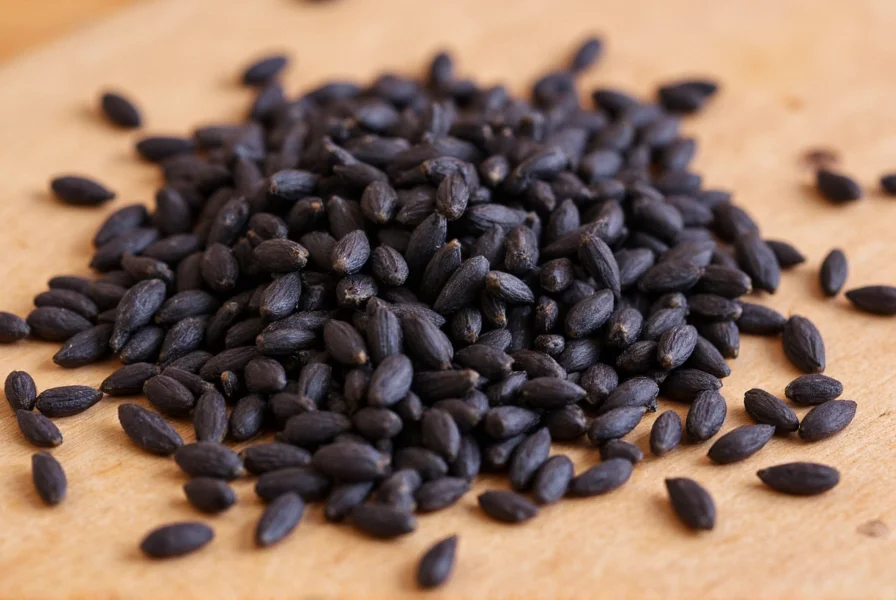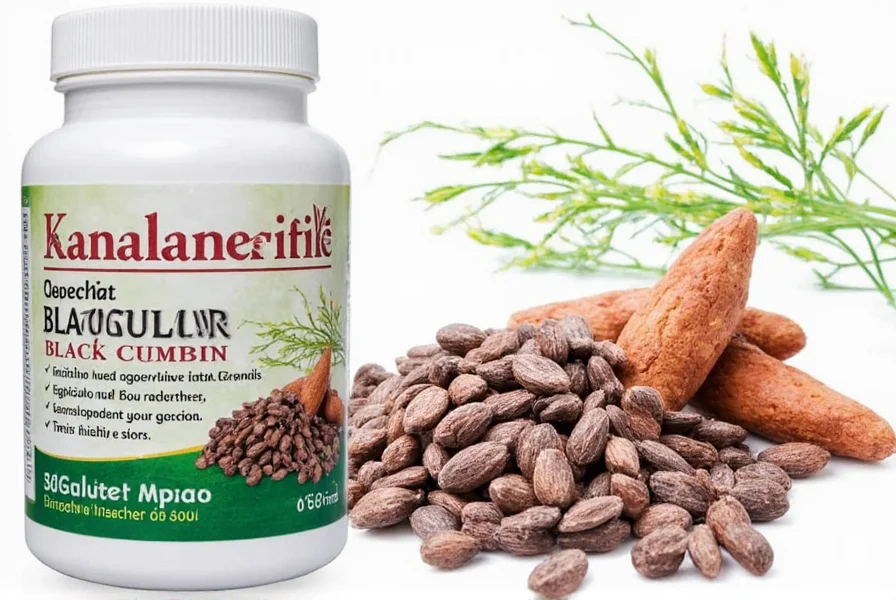For centuries, black cumin (Nigella sativa) has been valued across Middle Eastern, Asian, and African traditional medicine systems. Modern scientific research is now validating many of these historical uses while uncovering new potential applications. This small, black seed—distinct from regular cumin—contains over 100 bioactive compounds, with thymoquinone representing its most extensively studied component.
Understanding Black Cumin's Key Components
Black cumin seeds contain several therapeutic compounds that contribute to their health-promoting properties:
- Thymoquinone - The primary active compound responsible for most anti-inflammatory and antioxidant effects
- Nigellone - Known for respiratory benefits and bronchodilatory effects
- Thymohydroquinone - Shows neuroprotective potential in preliminary studies
- Fatty acids - Including linoleic and oleic acids that support cardiovascular health
- Vitamins and minerals - Particularly B vitamins, calcium, iron, and potassium
These components work synergistically, creating what researchers call the "entourage effect"—where the whole seed provides greater benefits than isolated compounds alone.

Evidence-Based Health Benefits of Black Cumin
Scientific research has identified several potential health benefits associated with black cumin consumption. It's important to note that while promising, many studies are preliminary, conducted on animals, or involve small human trials.
Powerful Anti-Inflammatory Effects
Chronic inflammation underlies many modern diseases. Multiple studies demonstrate black cumin's ability to reduce inflammatory markers:
- Research published in Phytotherapy Research found black seed oil significantly reduced CRP (C-reactive protein) levels, a key inflammation marker
- Thymoquinone inhibits NF-kB pathway, a central regulator of inflammation
- Clinical trials show benefits for inflammatory conditions like rheumatoid arthritis and osteoarthritis
Immune System Modulation
Unlike many "immune boosters," black cumin demonstrates immunomodulatory effects—meaning it can both enhance deficient immune function and calm overactive immune responses:
- Increases natural killer cell activity according to research in Immunological Investigations
- Shows promise for autoimmune conditions by regulating T-cell responses
- May reduce allergy symptoms by stabilizing mast cells
| Benefit Category | Scientific Evidence Level | Key Research Findings |
|---|---|---|
| Anti-inflammatory | Strong human evidence | Significant reduction in CRP and other inflammatory markers in multiple clinical trials |
| Antioxidant | Strong laboratory evidence | Increases glutathione levels and reduces oxidative stress markers |
| Metabolic health | Moderate human evidence | Improved insulin sensitivity and lipid profiles in type 2 diabetes studies |
| Respiratory support | Moderate human evidence | Reduced asthma symptoms and improved lung function in clinical trials |
Antioxidant Protection
Black cumin ranks among the most potent natural antioxidant sources. Its antioxidant capacity works through multiple mechanisms:
- Directly scavenges free radicals through thymoquinone and other compounds
- Boosts the body's natural antioxidant systems, particularly glutathione
- Protects cellular structures from oxidative damage
- Research shows it may protect against oxidative stress-related conditions including neurodegenerative diseases
Metabolic Health Support
Several clinical studies indicate black cumin may support healthy metabolic function:
- A 2019 meta-analysis in Complementary Therapies in Medicine found black seed oil significantly improved fasting blood glucose and HbA1c in type 2 diabetes patients
- May improve lipid profiles by reducing LDL cholesterol and triglycerides
- Potential weight management benefits through effects on metabolism and appetite regulation
Respiratory Health Applications
Traditional use of black cumin for respiratory conditions is increasingly supported by scientific evidence:
- Clinical trials show reduced asthma symptoms and improved pulmonary function
- Nigellone component demonstrates bronchodilatory effects
- May reduce allergic rhinitis symptoms according to research in Asian Pacific Journal of Tropical Biomedicine
- Potential benefits for chronic obstructive pulmonary disease (COPD)
Practical Usage Guidelines
Understanding how to incorporate black cumin into your wellness routine requires attention to proper usage:
Available Forms and Recommended Dosages
Black cumin comes in several forms, each with different considerations:
- Whole seeds - Can be chewed (1-2 grams daily) or used in cooking; requires mechanical breakdown for optimal absorption
- Ground seeds - More bioavailable than whole seeds; 1-3 grams daily
- Black seed oil - Most concentrated form; typical dose 1-2 teaspoons (5-10ml) daily
- Capsules - Standardized extracts often contain 5% thymoquinone; follow product instructions
Safety Considerations
While generally safe, black cumin may not be appropriate for everyone:
- Pregnant women should avoid therapeutic doses as it may stimulate uterine contractions
- May interact with blood pressure medications, diabetes drugs, and immunosuppressants
- Topical application can cause skin irritation in sensitive individuals
- Discontinue use at least two weeks before surgery due to potential blood sugar and blood pressure effects
Research Limitations and Future Directions
Despite promising findings, important limitations exist in current black cumin research:
- Many human studies have small sample sizes
- Long-term safety data is limited
- Optimal dosing protocols haven't been standardized
- Most research focuses on short-term interventions
Future research directions include larger clinical trials, standardized extracts, and investigation into specific mechanisms of action. Scientists are particularly interested in black cumin's potential neuroprotective effects and cancer-related applications.
Integrating Black Cumin into a Holistic Health Approach
Black cumin works best as part of a comprehensive wellness strategy:
- Combine with other anti-inflammatory foods like turmeric and ginger
- Use alongside stress management techniques, as chronic stress undermines many health benefits
- Pair with regular physical activity to maximize metabolic benefits
- Consider it complementary to—not a replacement for—conventional medical care
Frequently Asked Questions
What is the most effective form of black cumin for health benefits?
Black seed oil generally provides the most concentrated and bioavailable form of black cumin's active compounds. Cold-pressed, unrefined oil preserves the maximum therapeutic compounds. For specific respiratory benefits, some research suggests whole or ground seeds may offer advantages due to different absorption pathways. Standardized extracts containing 2-5% thymoquinone provide consistent dosing for therapeutic applications.
How long does it take to experience benefits from black cumin?
Most clinical studies showing measurable benefits used black cumin for 8-12 weeks. Some people report subjective improvements in energy or digestion within 1-2 weeks, but significant physiological changes typically require consistent use for 1-3 months. Anti-inflammatory and antioxidant effects may be detectable through blood markers within 4-6 weeks of regular consumption.
Can black cumin help with autoimmune conditions?
Research suggests black cumin may benefit certain autoimmune conditions through its immunomodulatory effects. Studies show potential for rheumatoid arthritis, multiple sclerosis, and lupus by regulating T-cell activity and reducing inflammatory cytokines. However, it should complement—not replace—conventional treatments. People with autoimmune conditions should consult their healthcare provider before using black cumin, as it may interact with immunosuppressive medications.
Does black cumin interact with medications?
Yes, black cumin may interact with several medication classes. It can enhance the effects of blood pressure medications, potentially causing hypotension. It may lower blood sugar, requiring diabetes medication adjustments. Black cumin might affect how the liver processes certain drugs through CYP3A4 enzyme interactions. It could potentially reduce the effectiveness of immunosuppressants. Always consult your healthcare provider before combining black cumin with prescription medications.
What's the difference between black cumin and regular cumin?
Despite similar names, black cumin (Nigella sativa) and regular cumin (Cuminum cyminum) are completely different plants from different botanical families. Black cumin seeds are small, black, and teardrop-shaped, while regular cumin seeds are larger, lighter brown, and crescent-shaped. They contain different active compounds—thymoquinone dominates in black cumin, while cuminaldehyde characterizes regular cumin. Their health benefits and culinary uses differ significantly, though both have traditional medicinal applications.











 浙公网安备
33010002000092号
浙公网安备
33010002000092号 浙B2-20120091-4
浙B2-20120091-4